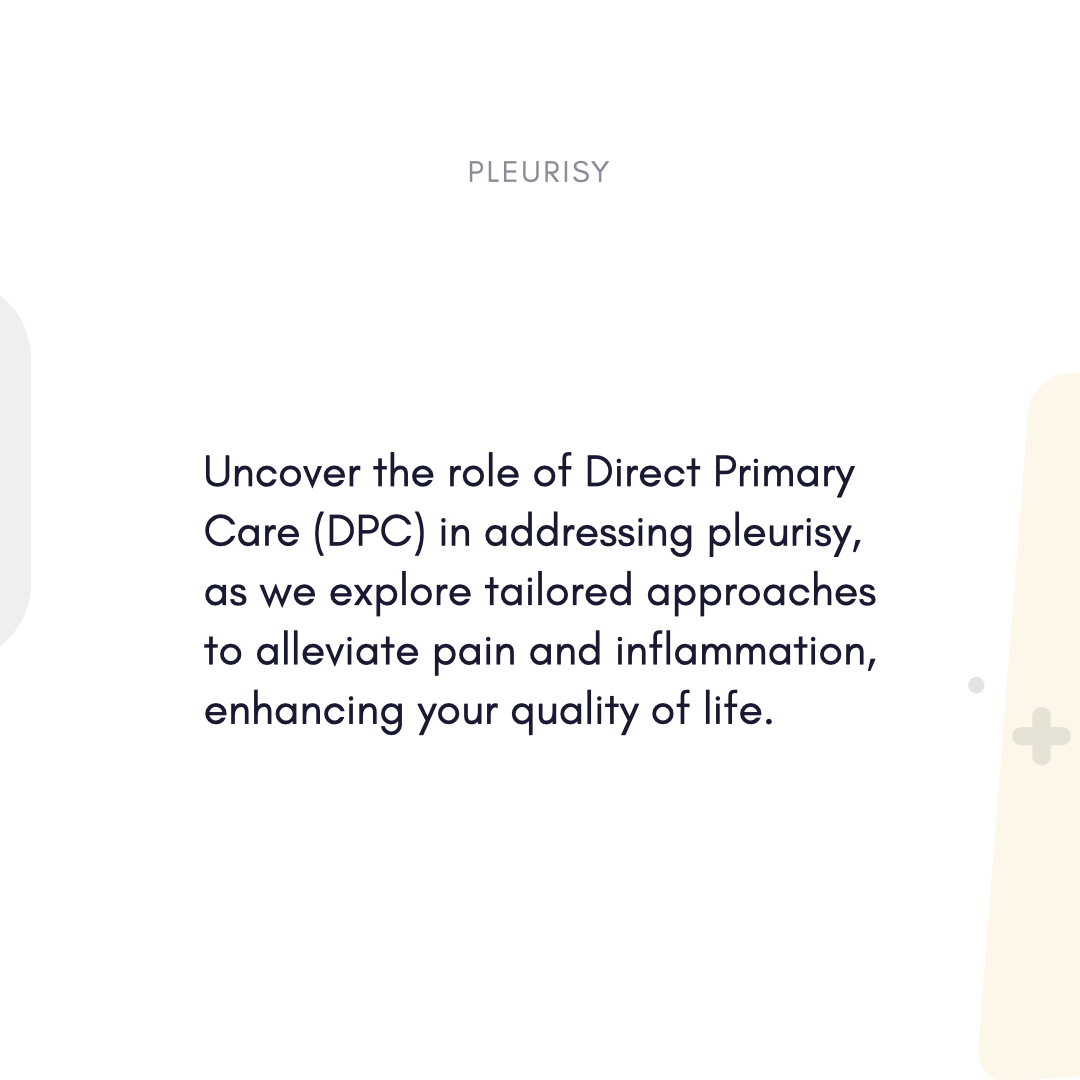Pleurisy and Direct Primary Care (DPC): Relieving Chest Pain with Precision and Care
Every breath brought with it a sharp, stabbing pain. The worry it might be your lungs or heart. For thousands of pleurisy sufferers, this inflammation of the lung lining causes simple breathing to become excruciating. Though ER visits and scattered follow-ups are common in traditional treatment, Direct Primary Care (DPC) offers a quick, all-encompassing method to relieve pain and address underlying causes.

Understanding Pleurisy
Pleurisy, sometimes known as pleuritis, is inflammation of the pleural membrane—that which surrounds the lungs. Typical factors include:
- Viral infections—most common, like flu—have
- Bacterial pneumonia or tuberculosis
- Autoimmune diseases including rheumatoid arthritis and lupus
- Lung cancer or pulmonary embolism.
Among the symptoms are:
- Sharp chest discomfort aggravating with coughing or breathing.
- Shortness of breathing or dry cough
- Grating sound heard through a stethoscope—pleural rub
Unmanaged pleurisy's risks:
- Pleural effusion—a fluid accumulation—
- Compromise of respiratory conditions
- Missed diagnosis of life-threatening diseases (e.g., PE)
Urgent evaluation is stressed by the American College of Chest Physicians in order to exclude emergencies.
DPC Turns Around Pleurisy Treatment
Operating on a membership model usually 50 USD–150 USD/month, Direct Primary Care (DPC) provides unlimited access to your physician for a fixed fee. For those with pleurisy, this means no ER delays, no co-pays, and a treatment plan as sharp as your pain.
1. Quick Assessment and Identification of Problems
The easily available DPC model guarantees:
- Same-day visits for acute chest discomfort.
- Immediate diagnostics: D-dimer tests, chest X-rays, in-office EKGs.
- Suspected pulmonary embolism calls for urgent CT angiography referrals.
2. Individualized, Etiology-Driven Treatment
DPC doctors design customized plans compliant with pulmonology standards:
- NSAIDs (like ibuprofen) plus breathing exercises for viral pleurisy.
- Bacterial causes: For pneumonia, antibiotics including levofloxacin.
- Prednisone tapers or rheumatology coordination helps with autoimmune flares.
3. Complete, Economical Support
DPC lowers health and financial risk by:
- Cutting the cost of drugs NSAIDs' or anticoagulants' wholesale pricing.
- 24/7 telehealth access allows one to control side effects from medications or pain surges.
- Vaccines against flu and pneumococcal will help to prevent recurrence.
DPC's advantages for pleurisy patients
1. Unmatched Approachability
- 24/7 provider access during flare of nocturnal pain.
- For imaging or specialist consultations, no prior authorization delays.
2. Customized Interventions
- Low-dose CT scans for smokers experiencing unexplained pleurisy constitute cancer screening.
- Pain control: Opioids are not the only options; topical lidocaine patches abound.
3. Open and Reasonable Cost
- Included are consultations, basic imaging, and care coordination under membership.
- Typical savings from avoiding ER visits and hospital admissions: 2,000 USD+.
Real-Life Success Stories
- Case 1: Emma, 34, suffered with viral pleurisy following COVID-19. Her DPC physician taught diaphragmatic breathing, prescribed naproxen, and ruled out PE using telehealth. Relief from pain in ten days.
- Case 2: Thanks to same-day steroid adjustments and rheumatologist coordination from his DPC provider, James, 62, with lupus-related pleurisy avoided ER trips.
Typical Questions: DPC and Pleurisy
- Q: Can DPC manage crises like pulmonary embolism?
- A: It is indeed. Often at self-pay discounts, DPC doctors schedule immediate CT scans and coordinate ER care if necessary.
- Q: DPC seems reasonable for chronic autoimmune pleurisy.
- A: Undoubtedly. Under bundled pricing, members save on biologics co-pays and frequent specialist visits.
- Q: Should I call a pulmonologist?
- A: DPC doctors teamed with lung experts to guarantee cash-pay rates for thoracentesis or bronchoscopy.
Why DPC Benefits Patients With Pleurisy
Emphasizing DPC's alignment with chest pain recommendations, the American Academy of Family Physicians supports:
- Speed: Eliminating MI/PE over several hours instead of several days.
- Precision: Customizing treatment for root causes—infection, autoimmune, etc.?
- Tools to monitor pain trends and drug reactions empower you.
Live Fully, Breathe Easier
Pleurisy does not have to take your mental peace of mind. With DPC, you get a partner who walks with you toward pain-free breaths—every step of the way—who listens intensely, acts forcefully.






